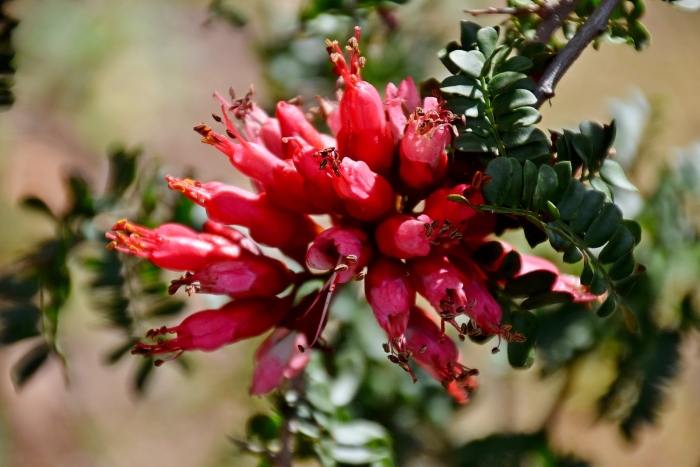Karoo Boer-Bean
(Schotia afra)
Karoo Boer-Bean (Schotia afra)
/
/

Krzysztof Golik
CC BY-SA 4.0
Image By:
Krzysztof Golik
Recorded By:
Copyright:
CC BY-SA 4.0
Copyright Notice:
Photo by: Krzysztof Golik | License Type: CC BY-SA 4.0 | License URL: https://creativecommons.org/licenses/by/4.0 | Uploader: Tournasol7 | Publisher: Wikimedia Commons |






















































Estimated Native Range
Summary
Schotia afra, commonly known as Karoo Boer-Bean, is an evergreen tree native to arid regions, including the plains and succulent thicket vegetation of the Eastern Cape in South Africa and Southern Namibia. It is a small tree, typically reaching a maximum height of 5 meters, with a distinctive gnarled trunk and rigid branches. The foliage is dense, providing a lush appearance throughout the year. The bright red to pink flowers are showy and bloom in small clusters from February to March, attracting a variety of bird species, including the Lesser Double-collared Sunbird and Malachite Sunbird, as well as being a breeding site for the butterfly Dantalis. Following flowering, the tree produces large, lime green to pink seedpods that mature to brown and disperse seeds through an explosive mechanism.
The Karoo Boer-Bean is valued for its drought tolerance, wildlife-friendly attributes, and ornamental features, including its striking flowers and unique seedpods. It is suitable for xeriscaping, as a focal point in small gardens, and in ecological restoration projects. This tree thrives in full sun and requires minimal water once established, making it a low-maintenance option for gardeners. It prefers well-drained soils and is tolerant of poor soil conditions. While generally disease-free, it can be susceptible to root rot if overwatered. The explosive seed dispersal mechanism should be considered in small spaces to avoid unwanted spread.CC BY-SA 4.0
The Karoo Boer-Bean is valued for its drought tolerance, wildlife-friendly attributes, and ornamental features, including its striking flowers and unique seedpods. It is suitable for xeriscaping, as a focal point in small gardens, and in ecological restoration projects. This tree thrives in full sun and requires minimal water once established, making it a low-maintenance option for gardeners. It prefers well-drained soils and is tolerant of poor soil conditions. While generally disease-free, it can be susceptible to root rot if overwatered. The explosive seed dispersal mechanism should be considered in small spaces to avoid unwanted spread.CC BY-SA 4.0
Plant Description
- Plant Type: Tree
- Height: 10-15 feet
- Width: 5-10 feet
- Growth Rate: Moderate
- Flower Color: Red
- Flowering Season: Spring, Summer
- Leaf Retention: Evergreen
Growth Requirements
- Sun: Full Sun
- Water: Low
- Drainage: Medium
Common Uses
Bee Garden, Bird Garden, Butterfly Garden, Low Maintenance, Potted Plant, Showy Flowers
Natural Habitat
native to arid regions, including the plains and succulent thicket vegetation of the Eastern Cape in South Africa and Southern Namibia
Other Names
Common Names:
Scientific Names: , Schotia afra, Guaiacum afrum, Guajacum afrum, Guillandinodes afrum,
GBIF Accepted Name: Schotia afra Thunb.